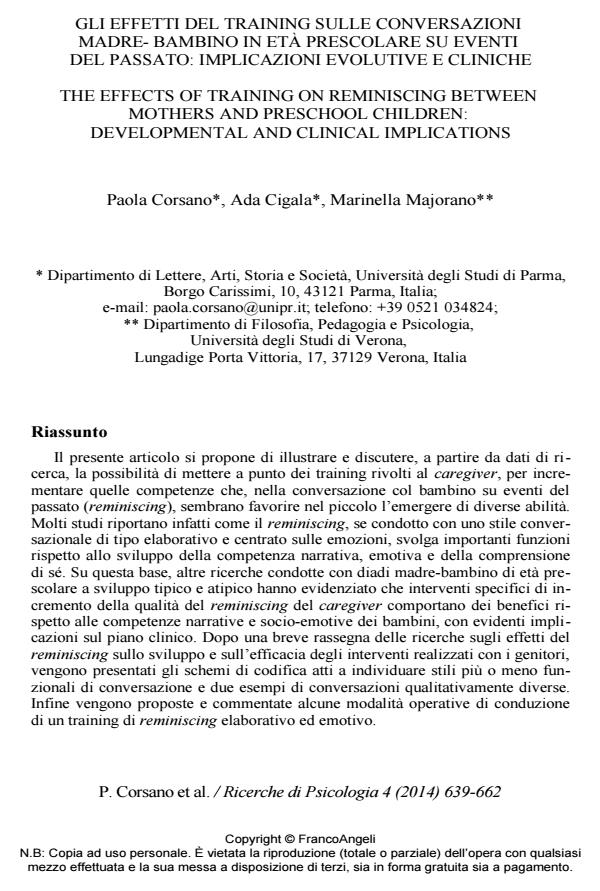The effects of training on reminiscing between mothers and preschool children: developmental and clinical implications
Journal title RICERCHE DI PSICOLOGIA
Author/s Paola Corsano, Ada Cigala, Marinella Majorano
Publishing Year 2015 Issue 2014/4
Language Italian Pages 24 P. 639-662 File size 238 KB
DOI 10.3280/RIP2014-004007
DOI is like a bar code for intellectual property: to have more infomation
click here
Below, you can see the article first page
If you want to buy this article in PDF format, you can do it, following the instructions to buy download credits

FrancoAngeli is member of Publishers International Linking Association, Inc (PILA), a not-for-profit association which run the CrossRef service enabling links to and from online scholarly content.
The present paper aims at discussing the possibility of improving training for caregivers, based on the research data, in order to increase those skills that, during conversations with a child about past events (reminiscing), appear to favour the emergence of various abilities. Indeed, many studies report how reminiscing, if carried out in an elaborate, conversational style that centres on emotions, performs important functions in the development of narrative, self-awareness and emotional competence. On this basis, other research carried out with mother-child dyads of pre-school age and typical and atypical development has shown that specific interventions to increase the quality of the caregiver’s reminiscing result in improvement in the child’s narrative and socio-emotive skills, with clinical implications. After a brief review of the research regarding the effects of reminiscing on development and the effectiveness of interventions carried out with the parents, the coding schemes designed for identifying more or less functional styles of conversation and two types of qualitatively different conversations are presented. Finally, some operating procedures for conducting training of elaborate and emotive reminiscing are suggested and commented upon.
Keywords: Parent training, reminiscing, mother-child conversation, preschoolers, language, emotions.
- Reminiscing on acute and chronic events in children with cancer and their parents: An exploratory study Laura Guidotti, Federica Solari, Patrizia Bertolini, Erika Gebennini, Giulia Ghiaroni, Paola Corsano, in Child: Care, Health and Development /2019 pp.568
DOI: 10.1111/cch.12673
Paola Corsano, Ada Cigala, Marinella Majorano, Gli effetti del training sulle conversazioni madre- bambino in età prescolare su eventi del passato: implicazioni evolutive e cliniche in "RICERCHE DI PSICOLOGIA " 4/2014, pp 639-662, DOI: 10.3280/RIP2014-004007